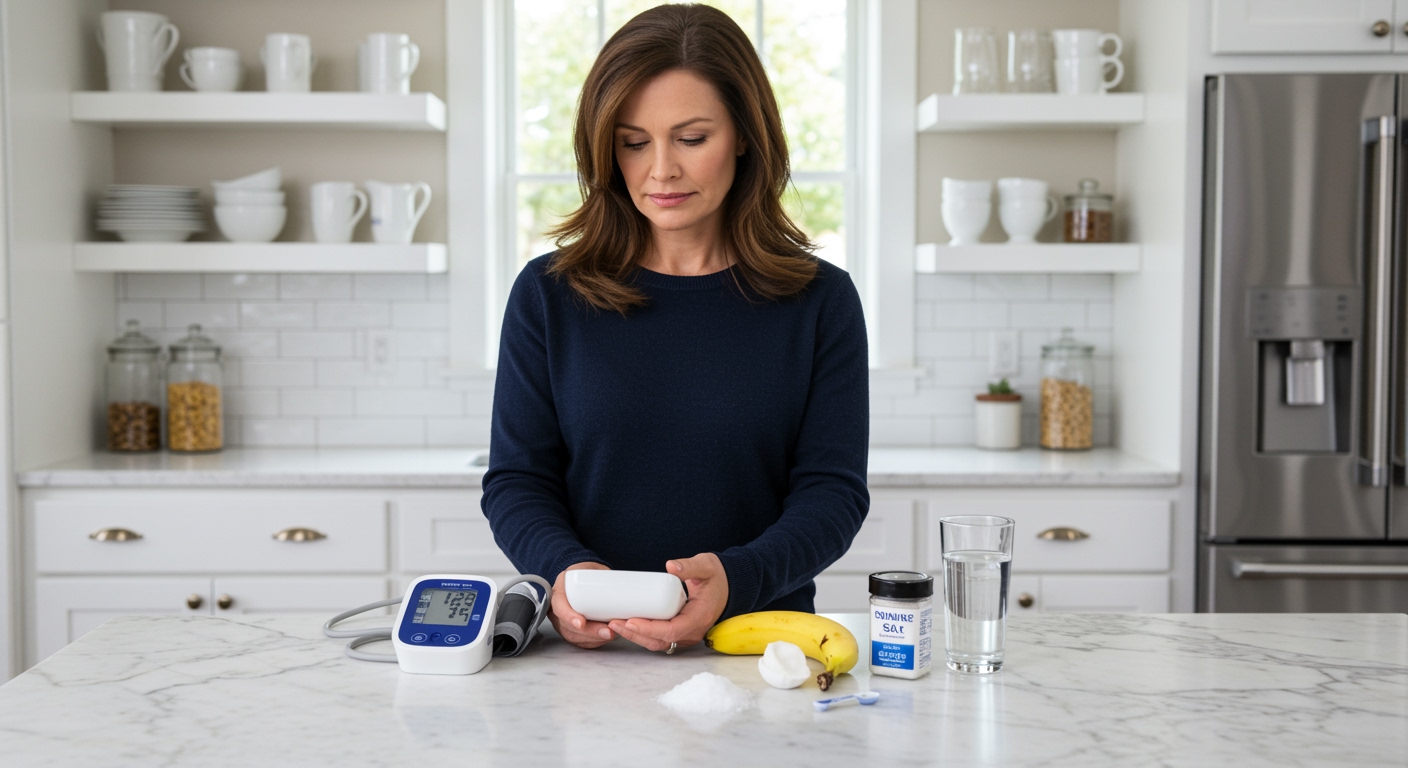✪ Key Takeaway: Low sodium diets can worsen hypotension by reducing blood volume and making symptoms like dizziness more severe.
Introduction
You have been told to cut salt from your diet for better health, but your blood pressure readings keep dropping lower.
You might be wondering if the popular advice about reducing sodium intake applies to everyone, especially when you already struggle with hypotension or low blood pressure.
Hi, I am Abdur, your nutrition coach and today I am going to explain how low sodium diets can actually harm people with hypotension and what you should do instead.
What Happens When You Have Hypotension?
Hypotension occurs when your systolic pressure drops below 90 mmHg or your diastolic pressure falls under 60 mmHg.
Your body struggles to pump enough blood to vital organs like your brain and heart when pressure gets too low.
This creates symptoms like dizziness, fatigue, blurred vision, and even fainting spells that can seriously impact your daily life.
Your kidneys play a crucial role in maintaining blood pressure through a system called the renin-angiotensin-aldosterone system.
When blood pressure drops, your kidneys release hormones that help retain sodium and water to increase blood volume.
However, this natural mechanism becomes less effective when you severely restrict sodium intake through your diet.
✪ Fact: Normal blood pressure ranges from 90/60 to 120/80 mmHg, and anything below 90/60 is considered hypotension.
How Does Sodium Affect Blood Volume?
Sodium acts like a water magnet in your bloodstream, pulling fluid into your blood vessels and maintaining adequate blood volume.
When you drastically reduce sodium intake, your body loses its ability to hold onto water effectively.
This leads to decreased blood volume, which makes your heart work harder to pump blood throughout your body.
Your blood vessels also become less able to maintain proper vascular tone, which is the slight muscle contraction that keeps blood flowing efficiently.
Research shows that people with hypotension who follow very low sodium diets often experience worsening symptoms because their blood volume drops even further.
The relationship between sodium and blood pressure works differently for people with low blood pressure compared to those with hypertension.
✪ Pro Tip: Track your blood pressure readings before and after reducing sodium to see how your body responds individually.
What Does Research Say About Low Sodium and Hypotension?
Multiple studies have shown that sodium restriction can be harmful for people with already low blood pressure.
A major research review found that people with normal or low blood pressure who followed very low sodium diets experienced increased risk of cardiovascular events.
The study revealed that the optimal sodium intake for most people falls between 3,000 to 5,000 mg per day, which is higher than current dietary guidelines suggest.
Researchers discovered that people with hypotension who consumed less than 2,300 mg of sodium daily showed increased markers of cardiovascular stress.
Their bodies activated stress hormones like cortisol and adrenaline to compensate for low blood volume, which created additional health problems.
The evidence suggests that blanket recommendations for low sodium diets do not apply to everyone, especially those with hypotension.
✪ Note: The relationship between sodium and blood pressure follows a U-shaped curve, where both too little and too much can cause problems.
Should You Increase Sodium If You Have Hypotension?
The answer depends on your individual health status, but many people with hypotension benefit from moderate sodium increases.
Healthcare providers often recommend that people with symptomatic hypotension consume between 2,300 to 3,400 mg of sodium daily.
You should focus on getting sodium from whole food sources rather than processed foods loaded with artificial additives.
Natural sources include sea salt added to home-cooked meals, naturally occurring sodium in vegetables, and small amounts of high-quality fermented foods.
The key is finding your personal sweet spot where your blood pressure stabilizes without causing other health issues.
Always work with a healthcare provider to monitor your blood pressure response when making dietary changes, especially if you take medications.
✪ Pro Tip: Start by adding a pinch of sea salt to your meals and monitor how you feel over several weeks.
What Other Strategies Help Manage Hypotension?
Beyond sodium management, several lifestyle strategies can help improve your blood pressure naturally and safely.
Adequate hydration plays a crucial role because dehydration makes hypotension symptoms much worse.
Aim for at least 8-10 glasses of water daily, and consider adding a small amount of natural electrolytes if you exercise regularly.
Regular physical activity helps improve cardiovascular function and can gradually raise blood pressure to healthier levels.
Focus on activities like walking, swimming, or light resistance training rather than intense workouts that might cause blood pressure to drop further.
Eating smaller, more frequent meals prevents the postprandial hypotension that many people experience after large meals.
Compression stockings can also help by improving blood flow from your legs back to your heart, reducing symptoms like dizziness when standing.
✪ Fact: Standing up slowly and flexing your calf muscles can help prevent sudden drops in blood pressure.
The Bottom Line
Low sodium diets can indeed be harmful for people with hypotension because they reduce blood volume and worsen symptoms like dizziness and fatigue.
One size fits all nutrition advice rarely works because every body has different needs and responds differently to dietary changes.
I would love to hear about your experience with managing blood pressure through diet, so please share your questions or thoughts in the comments below.
References
At NutritionCrown, we use quality and credible sources to ensure our content is accurate and trustworthy. Below are the sources referenced in creating this article:
- PubMed: Sodium intake and cardiovascular health
- Healthline: 6 Dangers of Sodium Restriction
- Harvard Health: Dietary salt and blood pressure: a complex connection
- Hackensack Meridian Health: Can Salt Help Improve Low Blood Pressure





